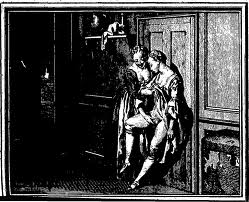Memoirs of a Woman of Pleasure...: Difference between revisions
No edit summary |
Jackie Sider (talk | contribs) No edit summary |
||
| Line 36: | Line 36: | ||
[[Category:Explicit Sexuality]] | [[Category:Explicit Sexuality]] | ||
[[Category:Literature]] | [[Category:Literature]] | ||
[[Category: | [[Category:For review]] | ||
{{DISPLAYTITLE:<span style="font-style: italic;">Memoirs of a Woman of Pleasure...</span>}} | {{DISPLAYTITLE:<span style="font-style: italic;">Memoirs of a Woman of Pleasure...</span>}} | ||
__NOTOC__ | __NOTOC__ | ||
Latest revision as of 19:55, 17 February 2012
Date: 1749 1821
Region: Europe North America
Subject: Explicit Sexuality
Medium: Literature
Artist: John Cleland (1709-1789)
Confronting Bodies: The Privy Council, The State of Massachusetts
Dates of Action: 1749, 1821
Location: England, The United States of America
Description of Artwork: Memoirs of a Woman of Pleasure, also known as Fanny Hill, 1749: an elegant flowery work of pornography describing the activities of a London prostitute. This novel enjoyed enormous popularity.
The Incident: 1749, England: Arraigned before the Privy Council for writing a literary obscenity, Cleland pleaded poverty. 1821, United States: Banned in Massachusetts in the first known obscenity case in the U.S.
Results of Incident: 1749, England: Cleland was reprimanded and given a pension of 100 pounds annually on condition that he not repeat the offense. The book went underground and remained the chief erotic classic for more than 200 years. 1963, United States: Published openly by Grove Press, the book was attacked by "decency" groups. The highest courts of New Jersey and Massachusetts declared it obscene; on March 21, 1966, the U.S. Supreme Court reversed the unfavorable judgments, clearing Memoirs of a Woman of Pleasure, also known as Fanny Hill for publication.
1965, Illinois: Prosecution of the book in Illinois was a major factor in the closing of a bookstore, Paul Romaine, Books in Chicago, according to Mr. Romaine. During the period when the book was emerging in the open market, it was seized in Berlin, burned in Manchester, England and burned in Japan.
Source: Banned Books 387 B.C. to 1978 A.D., by Anne Lyon Haight, and Chandler B. Grannis, R.R. Bowker Co, 1978.
